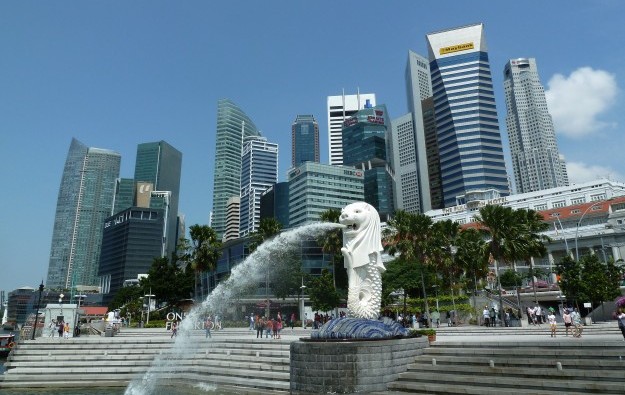Chinese visitors to Singapore fall 14 pct in 1Q
Jul 22, 2014 Newsdesk Latest News, Singapore, Top of the deck

Singapore saw a 14 percent fall year-on-year in visitors from the People’s Republic of China – currently the city-state’s second biggest market for inbound tourists – in the first quarter according to Singapore Tourism Board data released on Monday.
By contrast mainland visitor numbers to Macau rose 17 percent in the first quarter.
The Singapore government doesn’t give a detailed breakdown of tourism receipts from the city-state’s two casino resorts, but it says that nevertheless during the quarter receipts from “sightseeing, entertainment and gaming” rose by 19 percent year-on-year. It contributed to an overall 5 percent year-on-year hike in tourism receipts for the three months to March 31, which reached SGD6 billion (US$4.8 billion).
‘International inbound tourism receipts’ are defined by the United Nations World Tourism Organization as “expenditure of international inbound visitors, including their payments to national carriers for international transport”.
That definition includes local taxes. In Singapore’s case, that’s not only a 7 percent Goods and Services Tax (GST) on retail sales such as hotel rooms and restaurant meals, but also 15 percent gaming tax on mass market play and 5 percent on VIP play – plus GST in both cases – on any gambling they do in the city’s two casinos.
The Singapore government’s rationale for introducing casinos to the city-state starting in 2010 was to increase annual tourism to 17 million arrivals, compared to the 10.1 million recorded in 2008. It also said at the time that it wanted to double annual receipts from tourism to SGD30 billion by 2015, compared to the SGD15.2 billion achieved in 2008.
In the first quarter of 2014, Singapore visitor numbers were precisely flat judged year-on-year, at 3.9 million. Mainland China accounted for 14 percent of the visitors in the three months, with 557,000 arrivals, and for 13 percent of all tourism receipts, generating SGD800 million.
Singapore Tourism Board attributed some of the fall in Chinese tourists in the first quarter to the mainland government’s imposition in October 2013 of new rules governing tour agents in China. The rules include a reported prohibition of so-called ‘zero fare’ tours, a restriction that analysts have said is likely to have an impact on the lowest-income outbound Chinese tourists. Middle class and well-heeled Chinese travellers tend to use other visa schemes allowing independent travel.
Coincidentally, in the first quarter of 2014, Union Gaming Research Macau Ltd noted that VIP rolling chip volume at Las Vegas Sands Corp’s Marina Bay Sands casino resort in Singapore was down 6 percent sequentially and down 29 percent year-on-year.
There was no indication that was linked to a decline in mainland tourists, who if they qualified as high rollers would in any case need to have their credit to play managed directly by the house at Marina Bay Sands.
In the same quarter Genting Singapore Plc, owner of the Resorts World Sentosa casino resort, reported a 29 percent increase year-on-year in gaming revenue. Genting Singapore does not give a breakdown between mass-market and VIP revenue, but does – unlike Las Vegas Sands – work with the International Market Agents licensed by Singapore’s Casino Regulatory Authority to provide credit to gamblers in the city.
Visitor numbers from Taiwan to Singapore were down 8 percent from a year earlier in the three months to March 30, while the figures from neighbouring Malaysia, Singapore’s third-biggest market, slipped 1 percent. But visitors from next-door Indonesia, Singapore’s largest market measured by people and second largest measured by tourism receipts, were up 6 percent year-on-year.
Related articles
-
 Broker cuts Macau 2H mass GGR by 3pct...
Broker cuts Macau 2H mass GGR by 3pct...Jul 26, 2024
-
 China main Singapore visitor source...
China main Singapore visitor source...Jul 10, 2024
More news
-
 Donaco EBITDA up y-o-y to above US$4mln...
Donaco EBITDA up y-o-y to above US$4mln...Jul 26, 2024
-
 HK listed Palasino upgrades Czech...
HK listed Palasino upgrades Czech...Jul 26, 2024
Latest News
Jul 26, 2024
Border-casino operator Donaco International Ltd has achieved a 164.17-percent year-on-year increase in its latest quarterly group earnings before interest, taxation, depreciation and amortisation...Sign up to our FREE Newsletter
 (Click here for more)
(Click here for more)
Pick of the Day
”We’ve got more traction outside of Macau at the moment. But Macau’s going be a bigger focus for us”
David Punter
Regional representative at Konami Australia
Most Popular
 Sheraton brand to exit Londoner Macao, to be Londoner Grand July 25, 2024
Sheraton brand to exit Londoner Macao, to be Londoner Grand July 25, 2024  Macau regulator probes unlicensed gaming agents July 24, 2024
Macau regulator probes unlicensed gaming agents July 24, 2024  Philippines gives 20k aliens in POGOs 60 days to leave July 25, 2024
Philippines gives 20k aliens in POGOs 60 days to leave July 25, 2024  Philippines-listed DigiPlus says not affected by POGO ban July 24, 2024
Philippines-listed DigiPlus says not affected by POGO ban July 24, 2024  Sands China 2Q EBITDA down q-o-q amid low hold, renovation July 25, 2024
Sands China 2Q EBITDA down q-o-q amid low hold, renovation July 25, 2024






